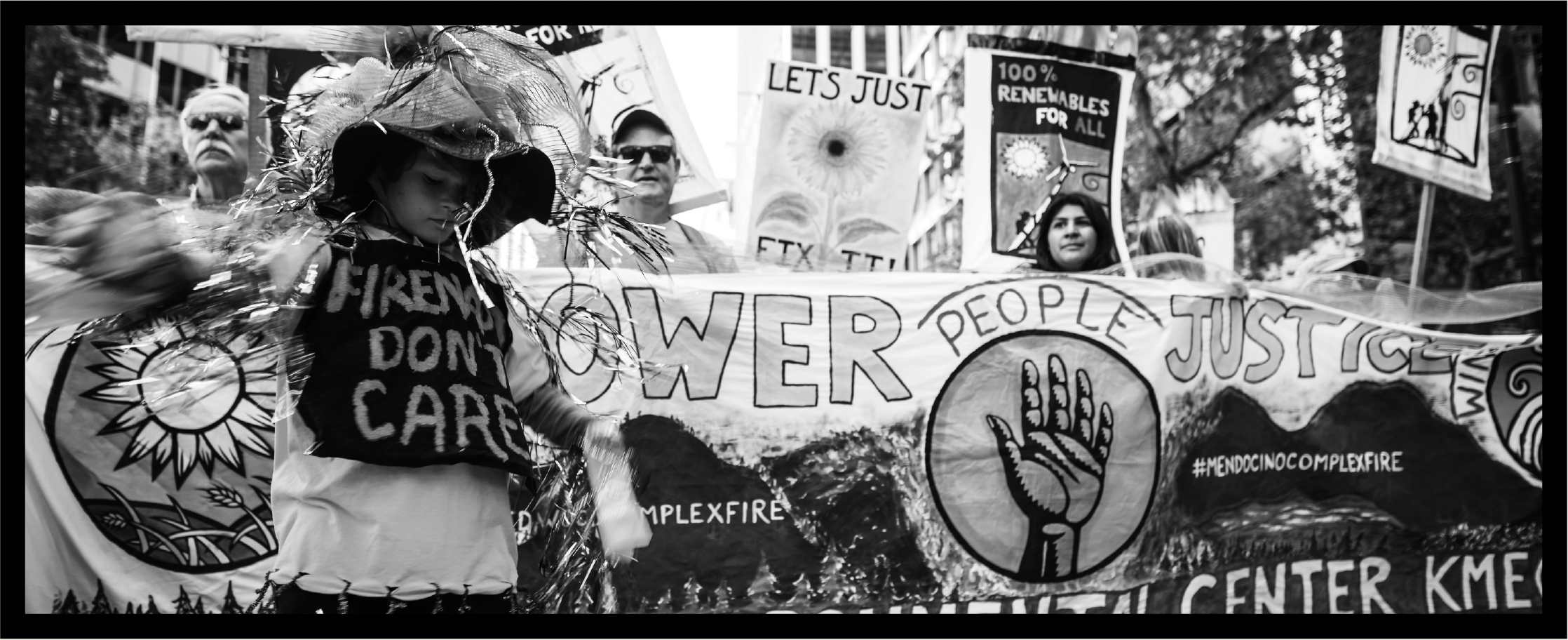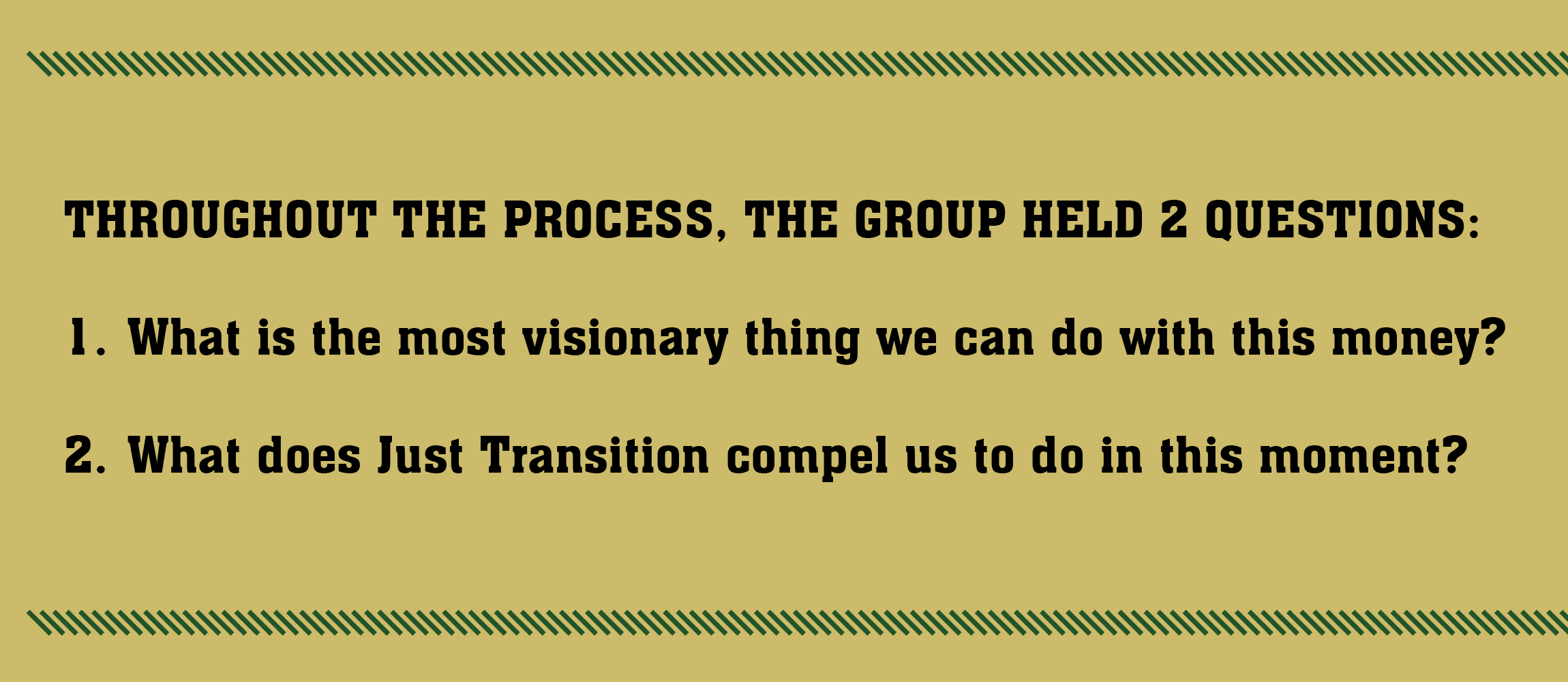
photo via the Climate Justice Alliance (Flickr)
There is a long history within the EJ/CJ movement of negotiating resource sharing with big greens, given that high-net worth donors and larger funders have historically moved significant contributions into these structures while neglecting grassroots EJ/CJ organizations. In part due to this disparity, grassroots organizations have come together multiple times over the past several decades to create a new center of gravity within the climate movement. Through processes that resulted in the Jemez Principles for Democratic Organizing, Principles of Environmental Justice, the Just Transition framework, CJA’s Just Transition Principles, Indigenous Principles of Just Transition and more, CJ leaders have put ground-up power building front and center, building relationships and shifting cultures of practice bit by bit within the mainstream environmental sector and philanthropy. This is why, when BEF decided to fund intermediaries and continue to fund well-resourced big greens, the grassroots organizing sector was prepared. With well-developed analyses and infrastructure, they created a new, movement-led funding vehicle and called on the funder intermediaries and big green recipients of BEF grants to transfer a portion of their funding into it.
This autonomous, grassroots-led-and-governed grantmaking structure was created in 2021, with the launch of the F4FP, a collaborative vehicle of Climate Justice Alliance, The Solutions Project, and other climate justice leaders, with the goal of receiving portions of BEF funding as well as additional funding from other supporters. F4FP, which is held at The Solutions Project at the request of grassroots leaders, is demonstrating the visionary ways it wants to be mobilizing, distributing, sharing and governing resources through a wealth redistribution model that puts equity and justice at the center and provides the opportunity to move wealth back to the communities that built it.
The F4FP is an experiment in frontline-governed philanthropy that not only shifts dollars, but also shifts strategy-setting, decision-making and grantmaking processes in ways that disrupt status quo philanthropy. The F4FP’s purpose is to move money to the grassroots organizing sector to support Just Transition/frontline-led climate solutions via a model through which grassroots leaders – not funders, big greens or CEOs – get to decide which climate solutions are funded. The leaders who created the fund drew inspiration from other models and examples of community- and movement-governed grantmaking and regenerative lending vehicles in the ecosystem, including the Environmental Justice Resourcing Collective, Seed Commons and CJA’s Our Power Loan Fund.
It took approximately 10–12 months to move from the call to action to securing funding commitments and installing the governing body. It took another 16 months to design the grantmaking process; receive, review and score over 400 applications; and determine the first round of grants. Over this period, many discussions were held about the highest purpose of these resources in service of grassroots social movements.

The F4FP decided to focus on community-based, equitable climate solutions that facilitate resilience, strengthen local regenerative economies and build power on the front lines of the climate crisis. In order to be eligible for grants, organizations must be majority BIPOC-led, primarily serve BIPOC communities and have an annual budget under $1.5 million.
In total, the F4FP raised $7.395 million for grantmaking and operations from 14 contributors, 7 of which are BEF grantees. Of the total amount raised, the F4FP governing body agreed to a $4 million grantmaking budget for the first grant cycle. The F4FP received over 400 applications requesting more than $60 million in support, highlighting the need for accountable grassroots funding felt across the field. Through solidarity philanthropy action, the F4FP was able to partner with the Environmental Justice Resourcing Collective at the Kataly Foundation to add another $1 million, thereby of granting a total of $5 million to support 48 inaugural grantees.
The grantees span 22 states and Puerto Rico with work that focuses on air quality, water quality, food sovereignty, energy democracy, clean transit, environmental health, workers’ rights, worker cooperatives, just recovery and more. More than 75% of the grantees have budgets under $500,000. For context, the operating budget of the Environmental Defense Fund, one BEF grantee, was $273 million in 2022, more than 500 times the budget of the majority of F4FP recipients.
So far, 10 funders/donors and 4 big greens have contributed a total of million to the F4FP. Of the current funders, 7 are BEF grantees. Fund for Frontline Power funders to date include –
- The Solutions Project $1,000,000
- Seventh Generation Fund $500,000
- Hive Fund for Climate & Gender Justice $1,000,000
- Kataly Foundation Environmental Justice Resourcing Collective $1,000,000
- Ceres Trust $350,000 4
- ClimateWorks Foundation $650,000
- SWAHA Foundation $100,000
- Building Equity and Alignment for Environmental Justice $760,000
- Union of Concerned Scientists $850,000
- Rocky Mountain Institute $200,000
- Natural Resources Defense Council $500,000
- Sierra Club $200,000
- Elizabeth Skavish and Michael Rubenstein $150,000
- Women Donors Network $135,000
Movement vehicle: The F4FP was a movement-led response to a controversial convergent moment of crisis, collapse and transition in which exorbitant wealth built from the extractive economy model (unsustainable, exploitative, bad for the Earth and bad for workers) was moving to support climate solutions – while also continuing to benefit from the extractive economy and contributing to the interwoven climate, environmental and economic crises. The F4FP is both a symbol of grassroots visions subverting top-down funding and a real tool to divert funds from harmful, top-down climate “fixes” toward tested, scalable, community-based and frontline-led climate solutions.
Grassroots vehicle: The F4FP is fully grassroots governed. Grassroots leaders decide which climate solutions get funded and move resources to the grassroots organizing sector via a solidarity philanthropy model.
Learning vehicle: The F4FP provides the opportunity to build grassroots skills for collective governance of capital/resources.
To download the PDF of “Good, Bad, Bezos And Beyond: Climate Philanthropy And The Grassroots” report, click here.
